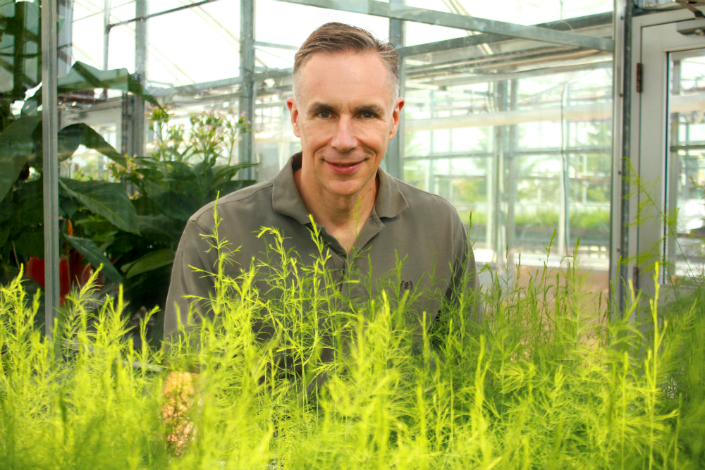Since beginning their research in the late 1800's, plant agricultural scientists at the University of Guelph have broadly impacted the daily lives of growers, consumers and industry in Canada and throughout the world:
- Guelph’s ranking as the most inventive university in Canada, by the Impact Group, is largely (85% to 94%) attributable to discoveries disclosed by Ontario Ministry of Agriculture and Food and the Ministry of Rural Affairs (OMAF and MRA) supported researchers. The majority of the disclosures discoveries disclosed by researchers to the University of Guelph through the Catalyst Centre were made by the plant breeding programs in the Plant Agriculture Department.
- Yearly, researcher scientists in the Department of Plant Agriculture release and test new crop, fruit and vegetable varieties that increase yields, resist disease and pests, resist chilling, add value to farmers' fields, and benefit the environment, the consumer and industry, helping to bring more profit and choice to rural areas.
- Our plant varieties are grown by thousands of producers in Ontario and the rest of North America.
- By one measure, the total economic impact of the plant varieties released by the Dept. of Plant Agriculture totals at least $500 million/year, a huge return on investment, for which the University of Guelph receives ~$800,000 in royalties each year.
- New state-of-the-art technologies and processes being developed by our researchers are helping to bring about a new bio-based renewable economy, better for both the farm ecosystem and the consumer.
- Our research helped to introduce soybeans to Canada, now grown on tens of thousands of hectares, helping to nourish humans and animals with high quality protein, as well as to nourish the soil with renewable organic nitrogen - Alone, OAC Bayfield, a variety of soybeans released by the Dept. of Plant Agriculture, was grown on 400,000 acres in 199
 7.
7. - The asparagus, "Guelph Millenium", can increase yields by 40% compared to the U.S. varieties grown for many years in Ontario.
- Our research into molecular markers has accelerated traditional breeding of important agronomic traits in a variety of species including corn, field beans and soybeans, an example of molecular biotechnology helping farmers.
- Our researchers are frequent guests on television and radio and are quoted in newspapers and newsmagazines, helping to explain issues of food and environmental safety to the general public.
- Our researchers are developing a nitrogen test to reduce the environmental waste caused by fertilizer run-off and leaching, while allowing for better yields and lower costs for farmers. These tests may empower farmers to better manage their soil nitrogen, allowing real time nitrogen measurement during the growing season. Work is continuing on testing new types of fertilizers to benefit both farmers and the environment.
- Our researchers are working on diversifying the crops currently grown in Ontario, offering new choices to Growers. These crops include high antioxidant carrots, chives, herbs, sweet potato, nuts and medicinal plants.
- Our Faculty and Research Scientists are plenary speakers at major international scientific conferences and are invited to speak at universities and companies throughout the world.
- Our Faculty and Research Scientists are consultants to local, national and international corporations, converting theoretical knowledge to new products and safer food production.
- Our researchers speak to growers' groups and turn their concerns into active research.
- We have trained thousands of farmers, agricultural scientists, biotechnology workers, field extension specialists and many other professionals involved in agriculture, who now positively impact the economies of Ontario, the rest of Canada, and the world. This accomplishment is difficult to quantify in dollar terms, but likely dwarfs the other tangible economic indicators of our research impact.
- The Annual Muck Vegetables Growers' Conference, held since 1950, provides information on new vegetable varieties, disease control strategies and production practices for muck vegetable growers.
- Our researchers have increased food production in a number of developing countries in Africa and Central America.
- Our researchers (Amar Mohanty and Manju Misra) created hard plastic and foam materials composed of up to 20 – 30% soy oil that can be used to manufacture auto parts such as panels, storage compartments and seats. The use of renewable plant products to make industrial materials can reduce costs and is an environmentally alternative to manufacturing based on fossil fuels.
It is easy to forget in urban areas that farming not only brings about food production, but it is also humankind's most significant source of employment and income. As global climate change brings about upheavals in temperature and rainfall patterns, continued research and investment in basic and applied agricultural biology remains essential, as an insurance policy for humanity. It is estimated by the Food and Agricultural Organization (FAO), that more food must be grown in the next 50 years than all of the food ever produced by humans over the last 10,000 years. Research and training being conducted in the Department of Plant Agriculture will help to meet these enormous challenges.
Though the economic impact of our research is difficult to assess, it is clear that grants awarded to the Department of Plant Agriculture by the public and private sectors have resulted in an enormous return on investment, in economic, environmental and human terms. Any investment into research and the training of young people pays dividends for decades to come. We are grateful to national and provincial granting agencies such as the Ontario Ministry of Agriculture, Food and Rural Affairs (OMAFRA), NSERC, the Canadian Foundation of Innovation (CFI), the Ontario Research and Development Challenge Fund (ORDCF), and numerous growers' associations and corporations for their continued support of our research and training. The Department is excited about new initiatives in genomics, bioinformatics and other emerging sciences, that will help to continue the high impact of our innovative research and training programs.
